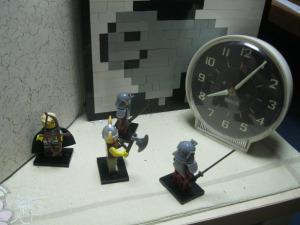The Forever War

ATTACK!!!
I was on a mini-vacation with my sisters this weekend, but some how a lot of it ended up being down time (while one sister took a nap, and then the other sister took a nap), so I finally got a chance to finish The Forever War by Joe Haldeman–although in the interests of full disclosure, I should mention that I read the last 45-minutes or so by the “flashlight” on my iPhone–which is really bright, and I wouldn’t recommend it (another flaw of paper books, I guess).
The book wasn’t recc’d specifically, but a person somewhere on this internet mentioned that they really liked it because the social aspects and how the fictional society handles homosexuality is interesting. And it was interesting.
The science was really awesome, too. It’s a book that includes FTL travel, but with the time dilation as a major aspect of the book. It was written back in the 1970s (here I am on the cutting edge of books again!), but the science is still pretty valid. Possibly more valid than certain science fiction stuff you can read today. I mean, time dilation, and also their ships didn’t have magical gravity (although they did have gravity, but from realstic physics), so that was amazing.
And the other interesting thing about it is that, since it was written in the 1970s, but is set in a war that begins in 1997 or so, it is itself displaced in time. Which is awesome, in a meta-ironic sort of way.
The homosexual society stuff is…basically there’s a soldier who gets sent on this war, which jumps him ahead several different chunks of time (decades at first, then centuries), and every time he returns to Earth society is vastly different, starting with open acceptance of homosexuality, which then leads to encouragement of it (as a cure for overpopulation), which leads to flat-out requiring it, and his heterosexuality being seen as a disease, and then…on into weirdness. It’s a very quiet sub-plot, and I thought it was an interesting look on how the future could play out, but it–maybe because their ‘overpopulation’ point was 9 billion people, which I think we’ve already hit? Or maybe because it went the ‘people are terrible‘ route, which I just can never buy on a societal level–it just didn’t ring true to me, if you know what I mean. Like, “well, okay, but society doesn’t actually work like that, and we’ve already dealt with a bit of this, but that’s not how it goes…” (they made a single common currency– HA! Euro, how’s that going?).
But it was interesting.
So the cultural world-building was interesting, and the science was interesting, which is great…but the plot was…less than.
It was a war novel, following the life career of a soldier who survived the whole 1000+ year war, so there was rising action as their weapons and engagements got more and more intense, and then it was over regardless of him, so I guess that’s realistic, but it felt a bit flat. Maybe I read too many sweeping epics, and I just don’t have a taste for realism in my war stories. A fruit-flavored-candy vs. fruit sort of issue.
Was it good? Yes. Do I regret reading it? No. Should you read it? Maybe; if my explanations of the interesting things interested you, then yes. If not, then no.





